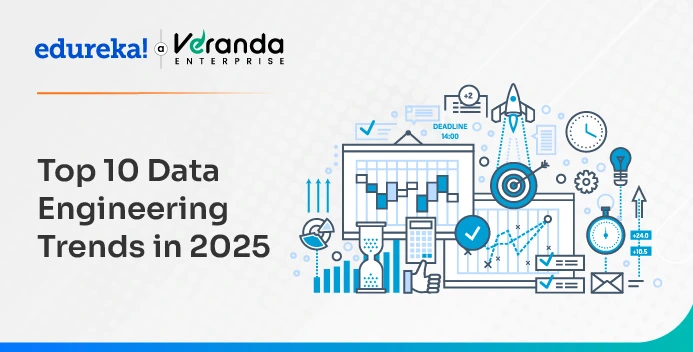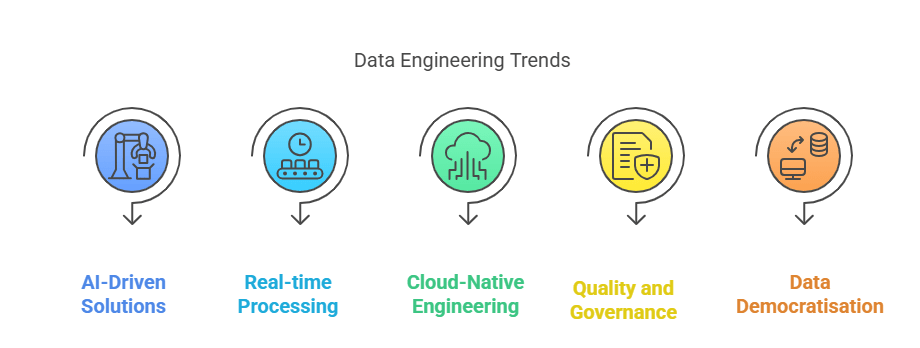Data Science and Machine Learning Internship ...
- 22k Enrolled Learners
- Weekend/Weekday
- Live Class

To remain competitive in the current digital environment, businesses must effectively gather, handle, and manage it. Data engineering can help with it. It is the force behind seamless data flow, enabling everything from AI-driven automation to real-time analytics.
This blog will explore the significant advancements, challenges, and opportunities impacting data engineering in 2025, highlighting the increasing importance for companies to stay updated.
In the fast-paced world of technology, data engineering services keep companies that focus on data running. To stay competitive, businesses need to adapt to new trends and find new ways to deal with ongoing problems by taking advantage of new possibilities in data engineering.
In 2025, this blog will discuss the most important data engineering trends, problems, and opportunities that companies should be aware of.
 1. Exponential Growth in AI-Driven Data Solutions
1. Exponential Growth in AI-Driven Data SolutionsThis approach, known as data building, involves integrating AI-based processes into the services. As early as 2025, the integration of these processes will become increasingly significant. It lets you describe data more complexly and make predictions.
It also lets you make decisions more automatically. AI-powered data engineering solutions make it easier to streamline the data management process, which helps businesses find useful insights with little to no manual work.
The demand for real-time data handling is expected to increase significantly in the coming years. Businesses such as finance, healthcare, and e-commerce are leading the way, requiring immediate information to make swift decisions.
To meet this need, people who work in data engineering will focus on making systems that can handle ongoing data streams with little delay.
Real-time data analysis is becoming more important, and technologies like Apache Kafka and Apache Flink are getting a lot of attention as powerful ways to handle this fast-paced data processing.
These days, cloud-based systems are the best choice for data engineering infrastructure because they are flexible and can grow as needed.
As more and more business apps move to the cloud, data engineering services should also change to take advantage of the benefits that come with using cloud-native tools and services.
Solutions like AWS Glue, Google Cloud Dataflow, and Azure Data Factory help businesses organize, integrate, and analyze data well. To help the business grow, this is what is driving the use of cloud-native data management.
In 2025, there will also be more attention paid to data quality and control. Companies now know that bad data quality leads to bad analytics and, ultimately, bad business strategies.
Stronger data validation checks, cleaning processes, and governance systems are being built into data engineering solutions to make sure that data is correct, safe, and reliable.
Companies all over the world will keep checking that they are following global data security rules like GDPR.
Organizations are under more pressure to “democratize” data, which lets teams that aren’t experts access and use data. Data engineering services will introduce self-service analytics tools and easy-to-use data interfaces in 2025 to enhance data accessibility for all.
This trend breaks down information silos within an organization so that more teams from different organizations can make decisions based on data without having to learn a lot of technical stuff.
There are more and more problems with data engineering, which makes the job of a data engineering consultant more difficult. For example, managing large-scale data pipelines that combine data from many sources must be done in a way that is both fast and reliable.
A major problem for data engineering services is the ever-increasing volume, diversity, and velocity of data. It’s challenging to integrate data from various sources and manage massive data pipelines while preserving high performance and dependability. The difficulty is in creating scalable and resilient architectures.
Most organizations still struggle to find experienced data engineers and data engineering consultants. Since the beginning, there has been a greater demand than supply for designers and managers of sophisticated data systems.
In addition to establishing partnerships with experienced providers of data engineering services, organizations should make investments in the training and upskilling of current staff members.
The methods that fraudsters use will likewise improve as data engineering solutions progress. Ensuring data security and privacy can be difficult, particularly when using cloud-based technologies and real-time data processing.
To preserve confidence and compliance in the data management process, stringent measures should be implemented, such as data encryption and frequent audits.
The majority of today’s legacy systems fail to meet the demands of modern data processing. So the combination of the new data engineering tools with the old ones complicates the endeavor.
Within the parameters set by the system in issue, the proper data engineering service will identify ways to ensure data integrity while striking a balance between the old and the new.
Building and keeping a strong data infrastructure does cost a lot of money. For real-time processing and cloud-based data engineering services to work, businesses need to be proficient at keeping costs down without sacrificing speed.
They will need to plan if they want to get the most out of their investments.
Top 10 Technologies To Learn In 2025

AI and ML have a huge amount of promise in the field of data engineering. AI and ML-based algorithms will be able to do tedious jobs automatically thanks to data workflows.
This will help make better analytics predictions and improve data management. Companies that use these technologies can become the best at making choices quickly.
2. Edge Computing Expansion
Edge computing is likely to become more important in 2025. With this type of processing, the data is closer to where it came from, which lowers delay and makes the best use of bandwidth.
It works well for time-based applications like IoT and self-driving systems, and consultants can make money by building architectures that use edge computing to process data faster and get insights right away.
3. Advanced Data Visualisation Tools
More people will want data visualization tools that are easier to use. Figuring out the pattern in data that is otherwise hard to understand can help you make the best choice possible.
Interactive and real-time data visualization solutions in data engineering will make it easier for departments to talk about data ideas with each other.
4. Sustainable Data Practices
These services could then make it possible for a more environmentally friendly way of handling data to be created and spread, leading to more environmentally friendly data practices.
It includes everything from making the best use of space for data storage to making data centers use less energy to making algorithms for handling data work better.
5. Collaboration with Cross-Functional Teams
As data is used in more parts of a business, it opens up more opportunities for data engineering services to work with cross-functional teams to provide more complete solutions.
When data engineers work together, they can make systems that meet the needs of different areas and make it easier for the company to follow through with its data-driven strategies.
In 2025, data engineering services are exciting, always challenging, and full of new chances. From the rise of AI-driven solutions to the rise of real-time processing and cloud-native methods, the field is always changing.
Businesses will be able to make better choices about how to use their data fully when they understand these trends and the problems that come with them.
In this world where things change quickly, organizations can stay ahead of the competition by working together with specialized data engineering experts and complex data engineering solutions.
 Thank you for registering Join Edureka Meetup community for 100+ Free Webinars each month JOIN MEETUP GROUP
Thank you for registering Join Edureka Meetup community for 100+ Free Webinars each month JOIN MEETUP GROUPedureka.co